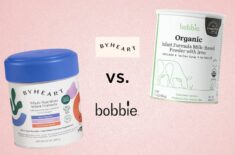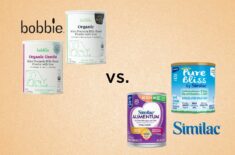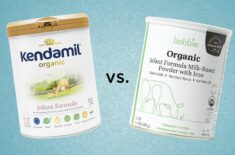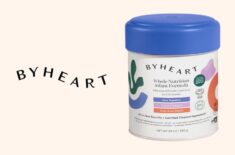Overview
What makes non-GMO formulas different from the ones with GMOs? Are they a safer and healthier choice for your baby?
What Does GMO Mean In Baby Formula?
“GMO” (genetically modified organism) is the term used to describe any animal, plant, or microorganism whose DNA (genetic material) has been altered through genetic engineering. (1)
The purpose of GMOs is to prevent crop loss and improve farmers’ yield because these GMOs are more resistant to diseases, viruses, and insect damage. They’re usually tolerant to herbicides, too, so that farmers can use these chemicals to control weeds without damaging crops. (1)
Is GMO Formula Bad For Babies?
While GMO foods and formulas may have provided consumers with more affordable options, there’s also growing concern about their impact on health.
Dr. Michelle Perro, a California-based pediatrician, recommends choosing organic formulas with non-GMO ingredients for your baby. She said: (2)
“Why not GMOs? There is an alarming rate of childhood disorders now including allergies, autoimmunity, neurological disorders (Autism and ADHD), growth failure, endocrine disruption, etc. There are modifications to the immune function that can take place prenatally and early in life which leads to the above disorders (‘developmental immunotoxicity’).
Increased exposure to environmental toxins during those sensitive times may contribute to the health conditions noted above.”
What Is The Difference Between GMO, Non-GMO, And Organic?
Note that there’s a difference between GMO-free and certified organic foods or baby formulas.
Non-GMO baby formulas or foods are those that are made without GMOs. They can come from organic or regular sources.
That’s why some formulas aren’t organic but are non-GMO. Examples are Similac Pro-Total Comfort and Enfamil Neuropro Gentlease.
Certified organic foods or formulas are all non-GMOs because the use of genetic engineering is prohibited in all organic products. They’re also free from pesticides, herbicides, and other harmful chemicals. (3)
High-quality regular formulas can still provide your baby with complete nutrition, but a non-GMO, organic infant formula may offer a healthier alternative.
While they might cost more than traditional formulas, you’re assured that the organic product doesn’t contain chemicals that may affect your baby’s health.
Which Baby Formula Is Non-GMO?
The following are some GMO-free formulas:
HiPP Organic Formula (28.22 oz can: $46.99)
- This European formula contains (prebiotics) galacto-oligosaccharides and (probiotics) Lactobacillus fermentum.
Holle Goat Based Formula (14.12 oz can, case of four: $32.99 each)
- It’s sourced from organic farms that follow the strictest EU standards.
Else Plant-Based Complete Nutrition for Toddlers (22 oz can: $36)
- It’s an organic plant-based formula that can provide your toddler with whole food nutrients for natural digestion.
Baby’s Only Organic Pea Protein Formula (12.7 oz can: $14.99)
- This dairy-free product may be the only pea protein formula currently on the market.
Enfamil Neuropro Gentlease (19.5 oz tub: $29.99)
- It has MFGM (milk fat globule membrane) that may support your baby’s cognitive development. (4)
Similac Pro-Advance (20.6 oz tub: $28.99)
- It has the prebiotic 2’-FL HMO (2’-fucosyllactose human milk oligosaccharide), which may support your baby’s developing immune system. (5)
Earth’s Best Soy-Based Infant Formula (23.2 oz tub: $31.96)
- It’s a soy formula with most of its ingredients from organic sources.
Continue reading for details about these non-GMO formulas.
HiPP Dutch Organic Combiotic Infant Milk Formula
Pricing
- 28.22 oz can, case of 10: $42.99 each
- 28.22 oz can, case of six: $45.99 each
Best Features & Safety
- It contains natural ingredients in breast milk: (prebiotics) galacto-oligosaccharides and (probiotics) Lactobacillus Fermentum cultures.
- It’s a European formula sourced from farms that strictly comply with EU standards (European Union) for organic farming.
Ingredients
- Organic whey
- Organic skim milk
- Organic lactose
- Organic vegetable oils (palm, sunflower, or rapeseed oil)
- Organic galacto-oligosaccharides (sourced from organic lactose)
- Whey protein
- Fish oil
- Choline
- Mortierella alpina oil (ARA)
- Hereditum Lactobacillus Fermentum CECT5716 (probiotics)
Nutrition Facts
Each serving of 3.4 oz has the following:
- Total fats: 3.6 g
- Total carbohydrates: 7 g
- Fibers: 0.3 g
- Proteins: 1.25 g
- Vitamin E: 0.7 mg
- Vitamin K: 5.1 mcg
- Iron: 0.5 mg
- Calcium: 51 mg
- DHA (docosahexaenoic acid): 13.2 mg
- ARA (arachidonic): 13.2 mg
- Omega-3 fatty acids: 0.06 g
- Omega-6 fatty acids: 0.4 g
Product Recall
In August 2021, Able Groupe recalled this formula and other products from HiPP, plus other European formula brands Bioland, Holle, and Kendamil for: (6)
- Lack of FDA (US Food and Drug Administration) pre-market approval
- Lower iron content than the recommended 1 mg per 100 calories
- Missing the label that indicates the possible need for iron supplementation
These formulas are still safe for consumption, but your baby might need iron supplementation. Consult with your pediatrician.
Pros
- It’s made with minimal manufacturing processes yet has a stable shelf life.
- It has DHA from fish oil.
- It’s free from corn syrup, gluten, soy, peanuts, artificial preservatives, colors, flavors, or other additives.
Cons
- It was recalled in the US. (6)
- Your baby may need iron supplementation if you use this formula.
- It has palm oil which can affect calcium absorption in your baby’s body. (7)
- It contains highly processed vegetable oils, such as rapeseed (canola).
- It can cost more than regular formula brands.
What Customers Say
Positive Reviews
“The HiPP Dutch works so well for my baby.” – Reviewer on Little Bundle.
Negative Reviews
“My son did not do well on this formula.” – Reviewer on Shopper Approved.
Holle Organic Goat Milk Formula
Pricing
- 14.12 oz can, case of four: $32.99 each
- 14.12 oz can, case of six: $30.99 each
- 14.12 oz can, case of 12: $28.99 each
Best Features & Safety
- It’s a goat formula sourced from farms that follow the strictest EU standards.
- It has smaller proteins than cow’s milk, which may make them easier to digest.
- It can be a gentle formula for babies with sensitive stomachs.
Ingredients
- Organic full cream goat’s milk powder
- Organic lactose
- Organic maltodextrin
- Organic vegetable oils (rapeseed or sunflower oil)
- Microalgae oil
Nutrition Facts
Each serving of 3.4 fl oz has the following:
- Calories: 68 kcal
- Total fats: 3.6 g
- Total carbohydrates: 7.5 g
- Proteins: 1.4 g
- Vitamin E: 1.3 mg
- Iron: 0.67 mg
- Calcium: 60.7 mg
- Linoleic acid: 510 mg
- Choline: 21 mg
- Iodine: 13.6 mcg
Product Recall
It’s among the European formula brand products (HiPP, Holle, Kendamil, and Bioland) recalled in August 2021 for: (6)
- Low iron content
- Failure to meet FDA pre-market requirements
- Incorrect labeling
Consult with your pediatrician before using this formula. It’s generally safe for consumption but your baby might need iron supplementation.
Pros
- It’s free from soy, added sugars, gluten, artificial preservatives, flavors, chemicals, or colors.
- It doesn’t have brown rice syrup or palm olein oil.
- It contains DHA from algae.
Cons
- It has had a recall in the US. (6)
- You may need iron supplements for your little one.
- It may cost more than regular formulas.
- It has vegetable oils and maltodextrin.
What Customers Say
Positive Reviews
“Cured my babies EZCEMA with Holle Goats Milk. ” – Reviewer on Organic Baby Shop.
Negative Reviews
“This product made my baby really sick. He’d throw it all up every time I gave it to him.” – Reviewer on Nursing Angel.
Else Plant-Based Complete Nutrition for Toddlers
Pricing
- 22 oz can: $36
- 22 oz can, case of two: $70
- 22 oz can, case of four: $136
Best Features & Safety
- It’s an organic plant-based formula.
- Each serving has 4 mg of iron per 180 calories (that’s 2.22 mg per 100 calories), which is twice the FDA’s minimum requirement of at least 1 mg of iron per 100 calories. (8)
- It’s free from dairy, soy, gluten, and corn syrup.
- It doesn’t use hexane for chemical processing and solvent extraction methods.
- It doesn’t use highly processed ingredients.
Ingredients
- Organic buckwheat flour
- Organic almond butter
- Organic tapioca maltodextrin
- Organic sunflower lecithin
- Organic cane sugar
Nutritional Facts
One serving of 4 fl oz contains the following:
- Calories: 180 calories
- Total fats: 9 g
- Total carbohydrates: 19 g
- Added sugars: 2 g
- Dietary fibers: 2 g
- Proteins: 5 g
- Vitamin A: 145 mcg
- Vitamin C: 4 mg
- Choline: 40 mg
- Iron: 4 mg
- Calcium: 220 mg
Product Recall
- None
Pros & Cons
Pros
- It doesn’t contain corn syrup.
- It’s a plant-based formula that can be suitable for vegetarians.
- It’s sustainably made.
- It can provide your toddler with whole food nutrients for natural digestion.
Cons
- It’s not suitable as baby food or formula during your child’s first year; it’s only for toddlers over a year old.
- According to the company’s website, this formula shouldn’t be used as your toddler’s sole nutrition source. Instead, it’s better to use it with breast milk, cow’s milk (formula), and/or solid foods.
- It contains tree nuts (almonds) and may not be ideal for kids with nut allergies.
- It may be prone to clumping.
- It has added sugars and maltodextrin.
What Customers Say
Positive Reviews
“My grand daughter cannot drink milk but she loves shakes made with Else and I love the extra nutrition she gets everyday from this.” – Reviewer on Else Nutrition’s website.
Negative Reviews
“This product taste disgusting! my baby does not like and she starting to gag. I spent a lot of money for a chemical product.” – Reviewer on Amazon.
Baby’s Only Organic Pea Protein Formula
Pricing
- 12.7 oz can: $14.99
- 12.7 oz can, pack of six cans: $89.94
- 12.7 oz can, pack of 12 cans: $179.88
Best Features & Safety
- It may be the only pea protein-based formula currently on the market.
- It’s free from soy proteins, dairy, and gluten.
- This plant-based formula can be suitable for Kosher diets and vegetarians.
- It contains essential fatty acids that may promote brain structure and eye development.
Ingredients
- Organic pea protein concentrate
- Organic brown rice syrup
- Organic high oleic oil (sunflower or safflower)
- Organic canola oil
- Organic linoleic sunflower oil
- Organic sunflower lecithin
- Organic coconut oil
Nutritional Facts
Each serving of 4 fl oz contains:
- Calories: 80 calories
- Total fats: 4 g
- Total carbohydrates: 9 g
- Proteins: 2 g
- Vitamin A: 70 mcg
- Vitamin D: 1.3 mcg
- Vitamin K: 7 mcg
- Choline: 10 mg
- Vitamin E: 1.1 mg
- Iron: 1.4 mg
- Calcium: 90 mg
- Potassium: 110 mg
Product Recall
- None
Pros & Cons
Pros
- It may be ideal if your child has food allergies or intolerance to dairy, gluten, wheat, soy, corn proteins, or tree nuts.
- It’s OU-certified Kosher.
- It’s free from insecticides, pesticides, or weed-killer glyphosate.
- It doesn’t contain DHA extracted with toxic chemicals that can damage the brain.
- It’s free from glucose or corn syrups as sweeteners.
- It doesn’t contain palm olein oil.
Cons
- It’s only for kids over one year old.
- According to their website, pea protein-based formulas haven’t been commercially approved for formula feeding. Still, the formulation meets all the nutrient composition requirements set by the U.S. Infant Formula Act and the AAP (American Academy of Pediatrics).
- It has brown rice syrup, a processed sweetener.
- It also contains vegetable oils, including canola oil.
What Customers Say
Positive Reviews
“I started this formula when my son was 4months old and it has been great he loves it and… I love that the ingredients has most the nutrients needed for development without having harsh chemicals or dairy products!!!” – Reviewer on Nature’s One.
Negative Reviews
“My baby didn’t do well he had a skin reaction.” – Reviewer on Nature’s One.
Enfamil Gentlease NeuroPro Baby Formula
Price
- 19.5 oz tub: $29.99
- 19.5 oz tub, case of four: $116.99
Best Features & Safety
- It contains smaller, easy-to-digest proteins.
- It contains MFGM (milk fat globule membrane), a breast milk component that can support your baby’s cognitive development. (4)
Ingredients
- Corn syrup solids
- Partially hydrolyzed nonfat milk
- Whey protein-lipid concentrate (from milk)
- Vegetable oils (palm olein, soy, coconut, and high oleic sunflower oils)
- Mortierella alpina oil (ARA source)
- Schizochytrium Sp. oil (DHA source)
Nutrition Facts
Each serving of 5 fl oz contains the following nutrients:
- Calories: 100 calories
- Total fats: 5.3 g
- Total carbohydrates: 10.8 g
- Added sugars: 0 g
- Proteins: 2.3 g
- Vitamin E: 2 IU
- Vitamin K: 9 mcg
- Iron: 1.8 mg
- Calcium: 82 mg
- Linoleic acid: 780 mg
- Choline: 24 mg
Product Recall
- None
Pros
- The proteins are smaller, which can make this formula easier to digest.
- It can be ideal for sensitive tummies.
- It has a thinner consistency and may make it dissolve more easily.
Cons
- It contains palm olein oil, other vegetable oils, and corn syrup.
What Customers Say
Positive Reviews
“The only formula that is gentle on my babies stomach.” – Reviewer on Amazon.
Negative Reviews
“This formula gives my baby bad constipation and horrible foul gas.” – Reviewer on Amazon.
Similac Pro-Advance
Price
- 20.6 oz tub, one tub: $28.99
Best Features & Safety
- It contains the prebiotic 2’-FL HMO (2’-fucosyllactose human milk oligosaccharide), which can support your baby’s developing immune system. (5)
- It contains OptiGRO, Similac’s special blend of vitamin E, DHA, and lutein which may help with brain development and eye health. (9)(10)
Ingredients
- Nonfat milk
- High oleic safflower oil
- Whey protein concentrate
- Soy oil
- Coconut oil
- Short-chain fructooligosaccharides
- 2’-FL HMO
- Lutein
- Crypthecodinium cohnii oil (DHA)
- Mortierella alpina oil (ARA)
Nutrition Facts
Each serving of 5 fl oz contains:
- Calories: 100 calories
- Total fats: 5.6 g
- Total carbohydrates: 10.5 g
- Proteins: 2.07 g
- Vitamin E: 1.5 IU
- Iron: 1.8 mg
- Calcium: 78 mg
- Linoleic acid: 1,000 mg
- Choline: 24 mg
- Iodine: 15 mcg
Product Recall
- None
Pros & Cons
Pros
- It doesn’t have artificial growth hormones.
- It contains DHA and ARA.
- There’s no palm olein oil.
Cons
- It contains highly processed vegetable oils.
- It has soy oil. While highly processed soy oil isn’t an allergen, you might choose not to include any soy ingredient in your child’s diet. (11)
- It may cause constipation.
What Customers Say
Positive Reviews
“My grandbaby is using this and she is doing great! Gaining weight, less fuss, better sleep, and not constipated.” – Reviewer on Similac’s website.
Negative Reviews
“Switched baby from advanced to this pro advance and that’s when problems started. He was restless, crying, gassy and inconsolable. He began to sleep less at night.” – Reviewer on Similac’s website.
Earth’s Best Non-GMO Soy-Based Infant Formula
Price
- 23.2 oz tub: $31.96
Best Features & Safety
- It’s a soy formula that may be suitable for lactose intolerance.
- It’s a plant-based infant formula that meets FDA requirements for complete nutrition.
- Most of this formula’s ingredients come from organic sources.
- It has DHA from algal oil.
Ingredients
- Organic corn syrup solids
- Organic palm olein or palm oil
- Soy proteins
- Organic soy oil
- Organic coconut oil
- Organic high oleic (safflower or sunflower) oil
- Mortierella alpina oil (ARA source)
- DHA algal oil (schizochytrium)
Nutrition Facts
Each serving of 5 fl oz contains:
- Calories: 100 calories
- Total carbohydrates: 10.6 g
- Total fats: 5.3 g
- Total carbohydrates: 10.6 g
- Proteins: 2.5 g
- Vitamin A: 300 IU
- Vitamin B6: 60 mcg
- Vitamin C: 12 mg
- Vitamin D: 60 IU
- Iron: 1.8 mg
- Calcium: 105 mg
- Linoleic acid: 750 mg
- Choline: 24 mg
Product Recall
- None
Pros & Cons
Pros
- It has ARA and DHA for your child’s eye health and brain development. (9)
- It’s Kosher certified.
Cons
- It doesn’t contain dairy ingredients but is manufactured in dairy equipment that may increase the risk of cross-contamination.
- It also has soy oil.
- It contains corn syrup and palm olein oil.
- It also has vegetable oils.
What Customers Say
Positive Reviews
“This one isnt harsh on her stomach, she doesnt spit up, shes not gassy.” – Reviewer on Earth’s Best website.
Negative Reviews
“The ingredients in this formula are stellar but unfortunately our little gal did not love it.” – Reviewer on Earth’s Best website.
Summary & Recommendation
These GMO-free formulas have different pros and cons. You can pick the best one, depending on what you want for your baby.
Choose:
- HiPP Organic Formula – if you prefer a European formula with a combination of prebiotics and probiotics.
- Holle Goat Based Formula – if you prefer goat formula sourced from organic farms that follow the strictest EU standards.
- Else Plant-Based Complete Nutrition for Toddlers – if you’re looking for an organic plant-based formula that may provide your toddler with whole food nutrients for natural digestion.
- Baby’s Only Organic Pea Protein Formula – if you want your baby to try a dairy-free product made from pea protein formula.
- Enfamil Neuropro Gentlease – if you prefer a formula with MFGM to support your baby’s cognitive development. (4)
- Similac Pro-Advance – if you prefer a formula with the prebiotic 2’-FL HMO to support your baby’s developing immune system. (5)
- Earth’s Best Non-GMO Soy-Based Infant Formula – if you prefer an organic soy formula.
REFERENCES
(1) https://www.fda.gov/food/agricultural-biotechnology/how-gmo-crops-impact-our-world
(2) https://www.greenamerica.org/blog/downsides-gmo-infant-formula-we-asked-pediatrician
(3) https://www.usda.gov/media/blog/2013/05/17/organic-101-can-gmos-be-used-organic-products
(4) https://bmcpediatr.biomedcentral.com/articles/10.1186/s12887-020-02087-9
(5) https://www.ncbi.nlm.nih.gov/pmc/articles/PMC6213476/
(6)
https://www.fda.gov/safety/recalls-market-withdrawals-safety-alerts/able-groupe-recalling-products-labeled-infant-formula-formulas-have-insufficient-iron-levels
(7) https://pubmed.ncbi.nlm.nih.gov/16582027/
(8) https://www.accessdata.fda.gov/scripts/cdrh/cfdocs/cfcfr/cfrsearch.cfm?fr=107.100
(9) https://pubmed.ncbi.nlm.nih.gov/10479465/
(10) https://www.ncbi.nlm.nih.gov/pmc/articles/PMC6164534/
(11) https://www.kidswithfoodallergies.org/soy-allergy.aspx












